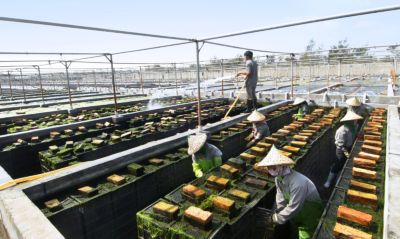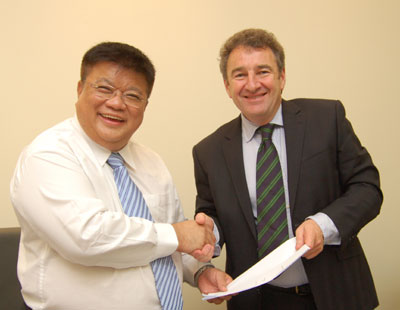
Fancy a gastronomic indulgence of an abalone-based meal for under Rmb50? Well, the next time you visit China, you should be able to enjoy just that.
Mid last month, Catalist-listed Oceanus Group (Oceanus) entered into a 70/30 joint venture with Ah Yat Abalone Group (Ah Yat) to establish a chain of food outlets under the Ah Yi Tian Xia brand name, serving value-for-money abalone-centric meals catering to the rapidly growing white-collar middle-class in the Middle Kingdom.
Renowned for its abalone and seafood restaurants in Singapore and China, Ah Yat will run the day-to-day operations and management of the food outlets, while Oceanus will supply the abalones and manage the corporate finance.
“We aim to open two or three Ah Yi Tian Xia outlets before the coming Chinese New Year,” remarked Dr Ng Cher Yew, executive chairman of Oceanus, during a recent interview with Shares Investment (Singapore).
“These outlets will serve as a trial, lasting six months, to ascertain the market receptiveness, streamline the operation and systemize the processes,” he added.
Leveraging on Ah Yat’s expertise and reputation in the food & beverage sector

For those who are unfamiliar with the company, Oceanus is a marine aquaculture specialist focusing on large-scale, land-based industrialized production and sale of premium quality Japanese abalones.
The company made its listing debut on the SGX in April this year through a reverse takeover of TR Networks.
Having earlier bought over and consolidated the operations of more than 50 smaller independent abalone producers, Oceanus is undoubtedly the market leader in the whole of China.
As at 30 September 2008, the company had approximately 17,500 farming tanks and a standing population of 172 million abalones.
Meanwhile, another 2,500 tanks are currently under construction and are slated for completion by the end of 2008.
Highlighting the company’s competitive edge, Dr Ng said that Oceanus’ farming facilities are strategically located along the sandy coastal lines of the Fujian province, where the warm water currents from the Taiwan Straits and the coldwater currents from northern China converge.
This gives rise to a water temperature of between 16 and 24 degree Celsius, which according to Dr Ng is ideal for the breeding and production of abalones.
Furthermore, the prevailing swift currents help to keep the seabed clean, thus enabling the company to erect a water filtration system embedded in the seabed that perpetually pumps fresh seawater into its farming tanks on land.
As mentioned by Dr Ng, this provides cost savings in water treatment and processing, which in turn reduces Oceanus’ cost of production.
Notably, Oceanus’ abalones are bred under carefully controlled environment to encourage their growth, survival and propagation.
This is necessary to ensure a consistent supply of high quality abalones throughout the year.
Constantly engaging in R&D collaborations with universities and research institutions, Oceanus is continually refining and improving its operational protocols for production as well as instituting new programmes such as genetic selection to maintain its unassailable leadership position.
Enhancing production capacity to sustain growth momentum

In a research report issued earlier, Daiwa Institute of Research (Daiwa) has stated that the biggest risk to Oceanus’ business is the systemic loss of its biological assets, its abalones, which were valued at Rmb383 million in the company’s balance sheet ended 30 September 2008.
Allaying worries of investors and analysts over this most significant risk, Oceanus has recently had its biological assets insured by China Fishery Mutual Insurance Association.
Arranged by global insurance broker Willis Group Holdings, the policy is reinsured by the RSA Group, an international insurance giant whose roots date back to 1710 in the United Kingdom.
“Considering that many aquaculture operators in the PRC generally do not meet ‘insurable’ criteria in some aspects of production system and risk management, the participation of international insurance companies in this policy reflects an endorsement and an accreditation of our management and methodologies,” commented Dr Ng, who owns a 39.2% equity interest in Oceanus.
For the nine months ended 30 September 2008, Oceanus’ earnings surged a remarkable 318% to Rmb314.2 million, excluding a goodwill write-off. This was achieved on the back of an equally spectacular 329% revenue increase to Rmb272 million.
Determined not to rest on its laurels, the company plans to raise its production capacity to up to 40,000 tanks by 2009 through acquiring or constructing additional farms in a bid to drive further growth.
Anticipating Oceanus to garner 16.7% of the global market share by 2010 (2007: 3.6%), Daiwa has recommended a ‘Buy’ on the company, with a discounted cash flow-based six-month target price of S$0.535.
This translates to a significant upside potential, as the company is gyrating at a mere S$0.135 as at the time of writing.
You are welcomed to post a comment or question at our forum.
Originally published at www.sharesinvestment.com , this article is reproduced here as part of a collaboration with NextInsight.
Related stories





